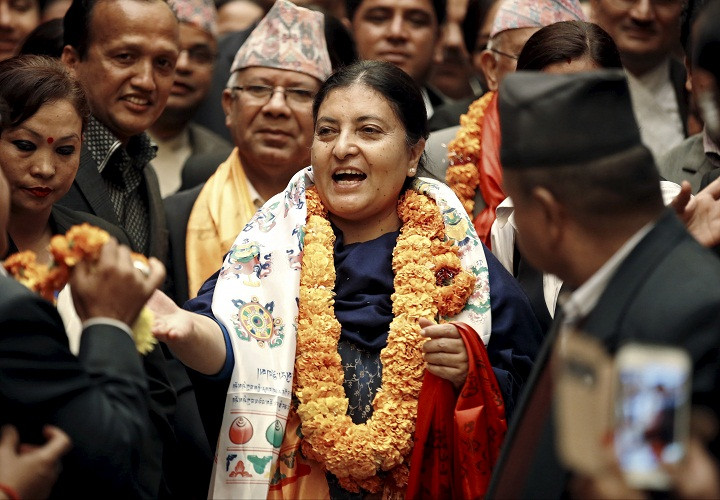Bidhya Devi Bhandari: Meet Nepal's first woman president

On Wednesday (28 October) Nepal got its second president since becoming a republic in 2008. Communist leader Bidhya Devi Bhandari created history when she was elected as the country's first female president, joining the list of scarce but significant woman leaders in South Asia.
Communist Party of Nepal (Unified Marxist-Leninist) leader Bhandari, 54, became Nepal's new president by winning a majority vote in Parliament where she bagged 327 votes as against Nepali Congress (NC) leader Kul Bahadur Gurung's 214. She won the election with the backing of UML's coalition partners and replaces Ram Baran Yadav, who was the country's first elected president in 2008 after Nepal abolished its monarchy. She is known to be a close confidante of Prime Minister KP Oli who was recently sworn in.
Foray into active politics
Nepal's new president had no big political ambitions in her college days and joined a student movement in 1979, which consequently led to her joining the Communist party. It was there that she fell in love with Nepal's most iconic communist leader Madan Bhandari who went on to become the party's general secretary and championed the cause of Nepal turning into a republic. However, he could not live to see Nepal abolishing the monarchy, as he died in a car accident under mysterious circumstances, in 1993.
It was then that Bhandari decided to join the UML and pitted herself against veteran NC leader and former prime minister Krishna Prasad Bhattarai. Riding the sympathy wave, she defeated Bhattarai from her late husband's constituency in Kathmandu.
When Nepal became a republic in 2008 it did not take much time for a charismatic leader like Bhandari to get noticed. In 2009, she became Nepal's first defence minister - a post she held until 2011 - and stood by the army, inviting the wrath of the Maoists. The same year, she became the party's vice chairperson.
Long known as a champion of woman's rights, Bhandari has been credited for pushing the one-third quota for women in parliament. However, her critics have hit out sharply at her in the past for her support to citizenship laws that are largely anti-women. They questioned her feminist credentials, as she supported a provision in the new charter that bars Nepali single mothers and women married to foreigners from passing on citizenship to their children.
Road ahead
Bhandari's appointment comes at a crucial time for Nepal, which put in place a new constitution in September aimed at stabilising the country. Certain provisions in the constitution have not gone down well with some minority communities in the south of the country who have since been protesting against the discrimination. The Madhesi community, which has been at the forefront of the violent protests in the country, has also been blocking a key border crossing with India, which supplies all of Nepal's fuel.
However, Nepal's presidential post is largely ceremonial like that in India and other parliamentary democracies. So, even though there is a lot to celebrate about in her victory, she may not be calling any shots as far as government decisions are concerned, given the constitutional limitations.
© Copyright IBTimes 2025. All rights reserved.





















